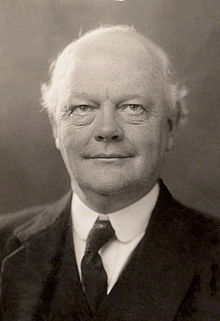Douglas Hogg, 1st Viscount Hailsham
|
The Right Honourable The Viscount Hailsham PC |
|
|---|---|
 |
|
| Lord High Chancellor of Great Britain | |
|
In office 28 March 1928 – 4 June 1929 |
|
| Monarch | George V |
| Prime Minister | Stanley Baldwin |
| Preceded by | The Viscount Cave |
| Succeeded by | The Viscount Sankey |
|
In office 7 June 1935 – 9 March 1938 |
|
| Monarch |
George V Edward VIII George VI |
| Prime Minister |
Stanley Baldwin Neville Chamberlain |
| Preceded by | The Viscount Sankey |
| Succeeded by | The Lord Maugham |
| Leader of the House of Lords | |
|
In office 5 November 1931 – 7 June 1935 |
|
| Prime Minister | Ramsay MacDonald |
| Preceded by | The Marquess of Reading |
| Succeeded by | The Marquess of Londonderry |
| Secretary of State for War | |
|
In office 5 November 1931 – 7 June 1935 |
|
| Preceded by | The Marquess of Crewe |
| Succeeded by | The Viscount Halifax |
| Lord President of the Council | |
|
In office 9 March 1938 – 31 October 1938 |
|
| Prime Minister | Neville Chamberlain |
| Preceded by | The Viscount Halifax |
| Succeeded by | The Viscount Runciman of Doxford |
| Personal details | |
| Born |
28 February 1872 England |
| Died | August 16, 1950 (aged 78) England |
| Nationality | British |
| Political party | Conservative |
| Spouse(s) | Elizabeth Marjoribanks (m. 1905; her death 1925) |
Douglas McGarel Hogg, 1st Viscount Hailsham, PC (28 February 1872 – 16 August 1950) was a British lawyer and Conservative politician.
Born in London, Hogg was the son of the merchant and philanthropist Quintin Hogg, seventh son of Sir James Hogg, 1st Baronet. He was educated at Cheam School and Eton College, before studying sugar growing in the West Indies. After serving in the Boer War he was called to the bar by Lincoln's Inn in 1902, was appointed King's Counsel in 1917, and became a bencher of Lincoln's Inn in 1920.
Hogg was appointed Attorney General by Andrew Bonar Law in October 1922. Though not an MP, Hogg was chosen for the position because Bonar Law found himself short of law officers after the Conservative-Liberal coalition collapsed as a result of the Carlton Club meeting. He was elected to the House of Commons unopposed the following month for St Marylebone in the general election. He received the customary knighthood and was sworn in the Privy Council in December 1922. Serving as Attorney General until Labour assumed office after the 1923 election, Hogg was reappointed to the post, with a seat in the Cabinet, when the Conservatives were returned to power in 1924.
...
Wikipedia
